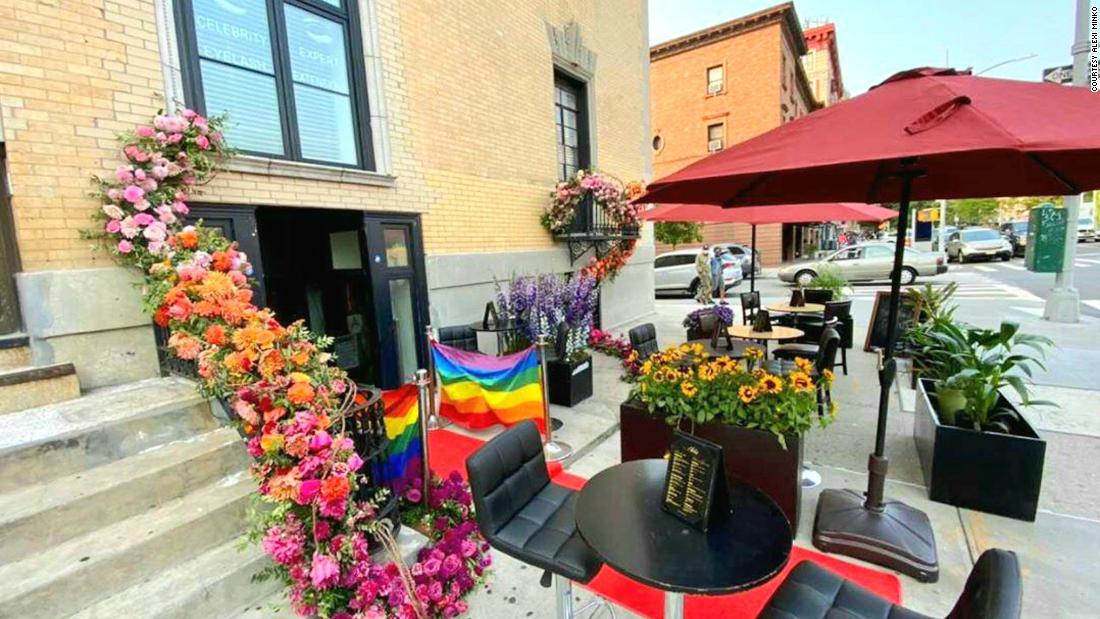Alexi Minko's bar is so much more than just a place to get a drink. When he opened the Alibi Lounge in 2016, it quickly became a permanent fixture for LGBTQ life in Harlem. Not only is it the first LGBTQ bar in the neighborhood, but Minko is one of just a few Black gay bar owners in the entire tri-state area. And it has remained open almost every day since it opened.
But like other small businesses across the United States, Minko's bar was hit hard by the pandemic. He's had to shut the bar for months, and even had to get rid of its food menu at one point -- a significant cut into profits -- based on state quarantine orders. And though the Alibi Lounge has reopened, it's operating on reduced hours and with only 25% capacity indoors.
"Our revenue's gone down," Minko told CNN. "I've talked to other small business owners, and some of them have just decided to quit."
But Minko said closing his bar isn't an option. He said the Alibi means a lot to the LGBTQ community in his neighborhood and he's committed to making sure it can survive the pandemic. A GoFundMe to help keep the bar afloat has already raised more than $169,000 -- and it's received additional funding, and been recognized nationally, by The Human Rights Campaign. But that still doesn't mean it's all been smooth sailing.
Part of the reason that closing bars like Minko's is so troubling is that gay and lesbian bars have held particular importance in LGBTQ history -- and still do.
They were often used for organizing and activist events. When churches didn't want to host LGBTQ people, they would congregate for Mass and worship at these bars.
"We often forget that even same-sex dancing was illegal up until the '60s or '70s," Eric Gonzaba, an American studies professor at California State University at Fullerton, told CNN. "These were once the only places where so-called 'immoral content' was allowed."
Even now, the importance of such bars as safe spaces for a community that often finds the outside world unwelcoming and hostile can't be overstated. "These gay bars have always serve as central spaces for LGBTQ people," Gonzaba said. "We should be fearful of losing that kind of community factor."
[G]ay and lesbian bars reached their peak during the period between World War II and the 1970s. As gay neighborhoods popped up around the United States, so did the demand for the bars as safe spaces.
A study published last December found there were more than 1,500 gay bars in the United States throughout the 1980s, but that number is closer to 1,000 today. Business listings for gay bars dropped 36.6% between 2007 and 2019 alone. And the numbers are worse for gay bars that predominantly serve women or people of color -- over half of those listings dropped in the same time period, according to the study.
"Lesbian bars have always struggled historically," she told CNN. "On average, women make less money than men. There's less disposable income, there's more turnover. And sometimes we forget how different experiences can be within the entire LGBTQ community."
The answer to why so many of these bars have closed is much more complicated than who is walking through those doors. Over the past few decades, the LGBTQ community has also found a home online. The proliferation of gay dating apps and LGBTQ influencers on social media apps such as TikTok has changed how users in these communities interact with one another. . . . But Brown-Saracino points out these interactions aren't the same as those at gay bars. . . . there is this desire for being in a room. Dating apps can also lead to engaging only with people that are closer in age to you. There's not that opportunity to have intergenerational and other unexpected connections."
Gonzaba said he is optimistic about the future of bars and doesn't think they'll go away. "I think it's totally conceivable that we might see a rebirth or a renaissance once people can interact again," Gonzaba said.
As for Minko, he said he's excited to see more representation in Harlem. Another gay bar, Lambda Lounge, opened this summer under limited capacity. It's the second Black-owned gay bar in the city, and another safe space in Harlem.
I hope such optimism proves correct. We need LGBT bars, especially in communities where there are no LGBT centers or other options for support.

1 comment:
You are right, we do need those little bars in smaller communities. It's such a shame that they may suffer the same fate other small businesses will suffer. All because of IMPOTUS and his failed policies. Or lack thereof... But there' hope.
XOXO
Post a Comment